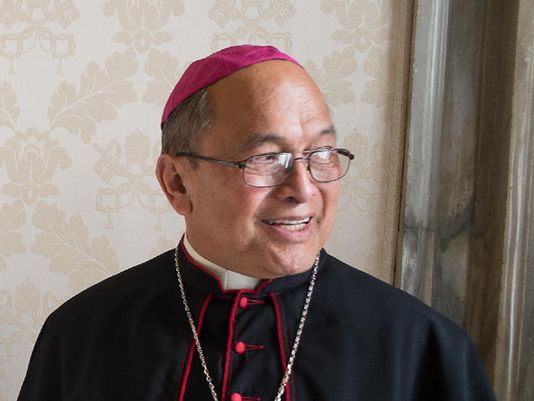Only Vatican Can Investigate Guam's Archbishop Apuron
By Jasmine Stole
Sexual assault allegations against an archbishop are supposed to be investigated by the Vatican, and not locally, according to an expert in the laws of the Roman Catholic Church. Although Guam Archbishop Anthony Apuron has been accused of sexually assaulting children in the 1970s, the alleged crimes happened so long ago they could not be criminally prosecuted, according to the Office of the Attorney General. Canon lawyer Jennifer Haselberger, an expert in church law, said Vatican policy dictates that only Rome can investigate bishops who are accused of sexual abuse. The Archdiocese of Agana on May 17 announced it had launched a local investigation in the sex abuse allegations against Apuron, which church officials have called “lies.” An attorney representing alleged abuse victim Roy Quintanilla has questioned the fairness and validity of the local investigation. While Catholic churches have their respective policies to respond to sexual abuse allegations, the Vatican also has guidelines, Haselberger said. A document with these guidelines, modified in 2010, states that if a bishop is accused of sexually abusing a minor, the Congregation for the Doctrine of Faith is to be notified, Haselberger said. Haselberger has practiced as a canon lawyer in the U.S. and internationally. She’s also a member of the Canon Law Society of America and earned a licentiate degree in canon law in 2004 from the Catholic University of Leuven, Belgium. When a bishop is accused of sexually abusing anyone under the age of 18, the investigation process is not one that can be handled at the local level, Haselberger said. “It has to be handled by the Congregation in Rome,” she said. She said this raises questions about the Guam archdiocese’s original response to the accusations, which was to involve the local church review board. Normally that would not be the case, Haselberger said. The Vatican’s norms apply to the universal church and are true for Catholic churches in Guam, the mainland and all over the world, she said. Bishops would certainly be aware of these norms, Haselberger said. If the Congregation for the Doctrine of Faith finds there is credibility to abuse allegations, the penalty could include removal from office and possible dismissal from clerical state, according to Haselberger. Apuron has been accused three times during the past month of sexually abusing altar boys when he was a priest at Our Lady of Mt. Carmel Parish in Agat in the 1970s. On May 17, Roy Quintanilla, 52, said Apuron molested him when he was a 12-year-old altar boy in Agat. Later, the mother of Joseph A. Quinata came forward. Now living in Arizona, Doris Concepcion said her son told her 11 years ago that Apuron had molested him when he was an altar boy. Quinata died when he was 38 years old. On Tuesday, Walter Denton, 52, accused Apuron of raping him in 1977, when he was a 13-year-old altar boy. No legal action has been taken against Apuron in connection with the allegations. The alleged crimes happened so long ago, they cannot be prosecuted, according to the attorney general’s office. The attorney general’s office has not received any police reports or criminal complaints filed by Quintanilla, Denton or from Quinata’s mother, claiming criminal sexual abuse or molestation, said Chief Prosecutor Phillip Tydingco. Tydingco said in the 1970s, the statute of limitations required prosecution to occur within three years for felony crimes and within one year for misdemeanor crimes. Some amendments to the statute of limitations for certain crimes have been made in Guam law, Tydingco said. “However, the U.S. Supreme Court has held that such a law cannot be used to revive a previously time-barred prosecution,” because it violates the U.S. Constitution, he said. Tydingco said first- and second-degree criminal sexual conduct crimes committed in Guam since 2011 have no statute of limitations. “But all criminal sexual conduct type crimes committed before 2011 are governed by the three-and one-year statute of limitations law,” Tydingco said. Contact: jstole@guampdn.com
|
.
Any original material on these pages is copyright © BishopAccountability.org 2004. Reproduce freely with attribution.
